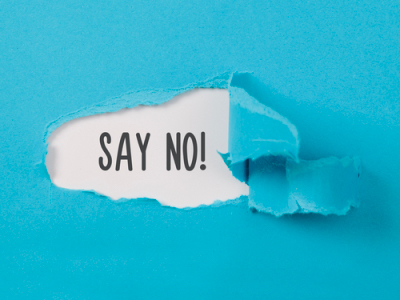Article by Vonnie Alexander, Founder at Vonnie Alexander Executive and Leadership Coaching
 In this can-do, solution-focused, people-pleasing, living life to the fullest world of ours what is it that we are missing out on by not saying no a little more often?
In this can-do, solution-focused, people-pleasing, living life to the fullest world of ours what is it that we are missing out on by not saying no a little more often?
This question was thrown into sharp relief by the recent lockdown when our lives were pared right back.
We are growing up with a desire “to have it all”, so rather than making choices about what we want most and what we are willing to forego in order to make time and space, we busy ourselves with more and more things to do. As we are all called back to normal life, I would ask yourself this: what do you want to bring back into your life and what are you perfectly happy leaving behind?
Saying no can be incredibly powerful. In order to make room for doing more of the things we love, we need to make space. It’s a little like de-cluttering your life rather than your home or your wardrobe.
But the challenge of saying no is far more complex than working out what to throw away, recycle or take to the charity shop. Or is it?
Why we struggle to say no
For many people, the natural tendency towards being people pleasers means that we don’t like to offend or risk being unpopular.
For others, the driver might be more about living life to the full, to not waste a second and seize the day. If you have ever heard anyone say: I’ll sleep when I’m dead, these are the people who are keen to get as much out of life as possible – and sometimes that comes at a cost.
In certain circumstances, “no” has potential consequences. If your boss asks you to do something, to what extent can you refuse? It could be career-limiting leading to loss of potential promotion, favour or even job potentially. So how you respond is everything. And let’s be clear: this is not about picking and choosing the tasks (work or life-related) that we most like and not doing the jobs we least like. We all have to do stuff that we don’t love.
The most delicate situations are these work-related ones – though families and friends can exert pressure too – the ones where you feel you are being judged by what you do, how much you do and so on, where rank and privilege might be at play. And this is especially true now. The economy and job market are already challenging and are set to get worse. So many people will feel inclined to accept “unrealistic” requests. This is where I would exercise caution. Be clear about what is realistic, possible or acceptable.
Be warned also that burn out is real and damaging. As someone who went through this five years ago, I can attest to the physical (migraines, anaemia, hair loss), mental (exhaustion, lethargy, depression) and emotional (guilt, feelings of failure and weakness) fallout. So, the message is to do what you need to do to survive and be empathetic and kind to yourself.
How to liberate yourself by saying no
Being able to say no requires you to master your own beliefs and values. In my case, I am a restless, hyper-achieving, people pleaser. There are many good aspects to all these qualities and yet sometimes, individually and together, they conspire to make me overcommit, become exhausted and ultimately lose my resilience or burn out.
For years I have burned the candle at both ends at home, at work and at play. Yet over the last few months I have, for the first time ever, prioritised sleep and exercise over just about anything else. Actually, one forces the other – I now exercise at 6am in the morning so I have to go to bed earlier which means I have to finish work earlier and so on. As with most things, making changes to your life is never easy. It requires determination, persistence and it will be tested.
Knowing which of your own drivers push you towards too many yeses is the first thing to become aware of. You have to catch yourself in the moment agreeing to something else that might tip you over your edge. That is the crucial moment of choice – you can do what you have always done or make a different choice. Neither is right or wrong. You are just bringing greater consciousness to your choices. Mastery means the reflex is more and more automatic and becomes unconscious.
And rather like that decluttering we talked about earlier, this is about making space for more of what you do want. Someone very clever once said, strategy is sacrifice. This is the life equivalent of that thought.
Catch yourself in the moment. Ask yourself: do I really want to do this? And then these four questions: What will happen if do? What will happen if I don’t? What won’t happen if I do? What won’t happen if I don’t?
Finally, thinking about doing this; do I come alive or does it make my heart sink?
Then make your choice, remembering that we don’t live in perfect worlds and sometimes the right thing to do isn’t necessarily the one you are most drawn towards.
For me, the perfect example is trying to cram too much in like being invited out to lunch somewhere and trying to squeeze another event on the other side of town into the day as well. Just trying to do too much, overcommitting and then not enjoying any of it, feeling exhausted and regretful. The ideal would be to do one thing, do it well and be fully present.
Easier said than done sometimes. And often less is more. Ultimately saying no is liberating – in the truest sense of the word.
About the author
 In 2002, I set up the communications agency Kitcatt Nohr Alexander Shaw with my three partners and grew the business before selling it to Publicis Groupe 10 years later. During that time, I saw it grow, stumble through the global financial crisis, and grow again both in reputation and performance.
In 2002, I set up the communications agency Kitcatt Nohr Alexander Shaw with my three partners and grew the business before selling it to Publicis Groupe 10 years later. During that time, I saw it grow, stumble through the global financial crisis, and grow again both in reputation and performance.
The agency was my pride and joy. Not only because of the list of illustrious clients with whom we shared so many achievements or the accolades we accumulated over the years, but also because of the culture we had created within it. Even then, I knew that one day I would focus exclusively on getting the best out of people and teams.
I have experienced first-hand what it takes to lead and to achieve ambitious business goals within organisations large and small. I have also observed that we can be at our most creative and resourceful when challenged or under pressure, if we are mentally prepared and supported by a strong culture. And that it doesn’t take much to knock us off balance if we are not.
I take enormous pleasure in helping individuals and organisations grow, and in developing strong and supportive cultures.
If you are a job seeker or someone looking to boost their career, then WeAreTheCity has thousands of free career-related articles. From interview tips, CV advice to training and working from home, you can find all our career advice articles here.






